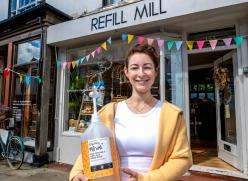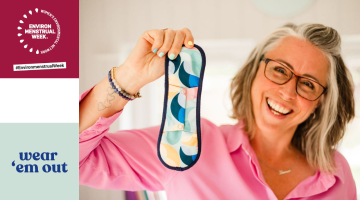Give refill a go! An interview with Refill Mill founder Vicki Daws

We sat down with Vicki Daws, the founder and director of Refill Mill in Ongar High Street, to learn more about the economic and environmental benefits of refill shops. In this interview, we found out about what inspired Vicki to start her journey into refill and how to enjoy a low-waste Christmas. We also discussed the benefits of using refill shops for yourself, the community, and the environment.
What inspired you to start a refill shop?
“When I first started this business, I was working as a Biomedical Research Scientist at the Francis Crick Institute in London. I've completed three degrees, including a PhD, and spent a lot of time studying and conducting scientific research. After I had children, I started to become really conscious of all the stuff that babies come with: wipes, nappies, food pouches and snacks, certain shampoos, body washes and creams, all designed specifically for children. Each of these products come in disposable packaging so I found I was throwing away so much rubbish, much of it not recyclable - and I just started to wonder how much harm this was causing. So, using my scientific background, I started researching the impact of the waste and single-use plastics, as well as looking into some of the ingredients in the products and foods I was using on their skin and allowing them to eat. I was blown away by what I discovered – so much is so harmful, both to the environment and to us, and although the general public are starting to become more aware, there’s so much we’re still in the dark about despite there being so much research in the scientific literature.
This made me want to shop a lot more sustainably. I wanted to find a shop like what I have now but there was nothing locally. It’s very hard to find sustainable products in the supermarkets and mainstream shops. It's also hard work to try and find the small companies that do care and make products that are more sustainable, they don’t have the same marketing budgets as the big corps so they’re much harder to find on search engines. Recognising this was a huge barrier for so many people to shop sustainably, despite lots of amazing products being out there, I decided to create my own sustainable lifestyle and refill shop, which started online during lockdown.
After restrictions had been lifted, an opportunity presented itself on my local high street when a shop became available as a ‘pop up’. I decided to give it a go, part-time in the shop and part-time in my research job. The shop continued to grow so we became a more permanent fixture, I left my job and have been working in the shop full-time ever since. It's the purpose of the business that's driving me even when times are tough. Where I'm based in Ongar, it's a relatively quiet high street without a huge footfall, so I am relying on my regular customers to come back. I try to raise people's awareness of what the global and local issues are, and how we can make a huge difference by trying to live a bit more sustainably ourselves.”
Do you find that most residents come across your shop by chance or is it a common theme that people are using those big transitional phases in their life to change their consumption habits?
“There are people who are very aware of the issues and will seek out a shop like mine specifically. They'll go online and search for their local refill shop, then they'll come in. There are also those that walk past the shop, have a peek inside but not really understand what it is. Or they think, “oh, it's one of those sustainable shops, it must be really expensive, or they won't have what I want in there”, and then walk past.
I sometimes stand at the door as people pass and occasionally they'll ask, “so what kind of shop is this then?” That gives me the opportunity to explain the concept to them. I say, for example, “when you run out of washing up liquid, you would normally throw the bottle away and go to the supermarket to buy another one. But instead of doing that you could bring the empty bottle into this shop, refill it and never have to throw another plastic bottle away”. They’ll often say that’s a great idea and then come in and have a little look. I can then show them it's not just washing up liquid, I have a whole range of different products such as hand soap, shampoo, conditioner, body wash, and food stuff, as well as more cleaning products. They're normally really interested.
Plastic waste is a problem which most people know and care about. I’m offering a solution to this issue, which helps people to feel empowered to start doing their bit. Even if you only ever refill your washing up liquid bottle, that's still making a massive difference. But often someone may start with one product and then slowly start bringing other things back to refill as well. Some people only refill liquids, some the cleaning products, or the personal care stuff, some people only the food – it really depends on what they are after, what they’re used to already and what they feel comfortable with changing. Luckily, I've got a range of goods to offer - so usually they can find something they want.”
What advice would you give to someone who is hesitant about visiting a refill shop and how do you think those barriers are overcome?
“I think lots of people think that it's going to be expensive and inconvenient. There are lots who live locally yet don't really visit the high street that much. So, for them, they'd be going out of their way to visit a particular shop on a high street to refill their stuff, whereas they could just get most of what I sell from the supermarket. To reach these people, we need more education on the current crisis and what can be done at a local level to tackle it, like using refill shops. We need to do more to explain the benefits of reducing plastic waste for the community and the environment, as well as for teaching our future generations. It's an easy and accessible way for us to do our bit for the planet and I believe if more people were aware of the impact, we could collectively have just by altering some shopping habits, it would encourage them to give it a try. In terms of cost, especially if you're comparing it to the eco brands in the supermarkets, then it more often than not does work out cheaper to refill in our refill shop.”
We'd also love to hear about the ways you engage with the community and specifically the work you're doing with a local school.
“I have been going out into the community and giving some talks recently. One of the first talks I did was at a local primary school before the summer last year. They invited me to do a whole school assembly and talk about the refill shop to teach the kids about reusing and reducing.
The school then contacted me and said that they would like to do a refill pop-up shop there. I thought it was brilliant! We set up a google form and I picked a few products from each of my ranges. In the form, we asked families to make sure they save containers at home. The eco-team from the school are coming to the shop tomorrow afternoon and they're going to do as many of the refills as they can themselves and then take the refills back to the school. Then next week they've got a day where all the parents will come into the school with their children to collect their refills. It'll be like they've got their own little shop.
It's so important for children to be learning about reuse at this age because that's when you can start to develop sustainable habits, and it’ll become the norm as they go into adulthood. Since I went into that school and did a talk, I have had quite a few of the families from the school come into the shop and say “oh, little Annie hasn't stopped talking about your shop and she really wanted to bring some containers in. She keeps telling me off when I throw things in the bin and then she wants to save them.””
So as Christmas is approaching, we wanted to know your top tips for a sustainable Christmas.
“I think at Christmas, people tend to think more, more, more. It’s easy to get caught up in the excess and think, “oh, it's Christmas, so I'll get that extra thing”. When you're thinking about buying gifts for people, especially for children – it's so easy to go overboard! I limit the amount I buy my kids, knowing they’ll get lots from other family members too, and try to give what they actually need or things that can be reused and handed down one day. I also buy as much preloved as I can which is a great way to help reduce waste and keep good toys in use. Giving experiences as gifts are another great option because they can create lifelong memories and are zero waste!
One of the biggest causes of waste at Christmas is the gift wrapping! So my top tip is to buy recyclable paper, preferably made from recycled materials too. If you've got wrapping paper and you’re not sure if it’s recyclable, do the scrunch test – hold it in your hand and scrunch it up into a ball, then open your hand up. If it stays scrunched up, it is recyclable. If it opens up again, it's got plastic in it, and it's not recyclable. If it’s not recyclable, put it in the black bin or you’ll risk contaminating the recycling and sending the whole lot to landfill.
Also try and buy small and local for your Christmas meal. Go to the local farm shop for loose veggies, buying without the packaging not only saves plastic but also means you only buy what you need saving food waste too! Go to the local butcher for your turkey and sausages, a local florist for flowers, wreaths, or garlands - you can get dried ones and then keep and use them year after year. This makes them excellent value and well worth it and again, you’re supporting more small local businesses.
We also have lots in the refill shop to help you save waste at Christmas - bring your own containers or we've got brown paper bags if you forget them. Write a list and get exactly the amount of food that you need so there's no waste at the end of the meal. We've got lots of herbs and spices, sage and onion stuffing mix, snacks, chocolates, and sweets. So, if you know the number of people coming to your Christmas meal, say six people, you can write down the exact quantities of herbs, spices, dried ingredients that you might need for six people, and this will stop you buying too much and creating waste. We also have some amazing plastic-free gift options, all sourced from small ethical businesses with the option to build your own gift box decorated with natural botanicals and dried fruits for a totally hassle free, zero waste and unique gifting experience!”
We thank Vicki for taking the time to us about the environmental and community benefits of refill shops. We hope it inspires you to visit your local refill shop and see how you can save your pennies and protect the planet by reducing waste.
Have a read through our refill shop webpage if you’d like to know more about your local refill options, and check out our A to Z guide to Christmas if you want more ideas for a low-waste Christmas.

